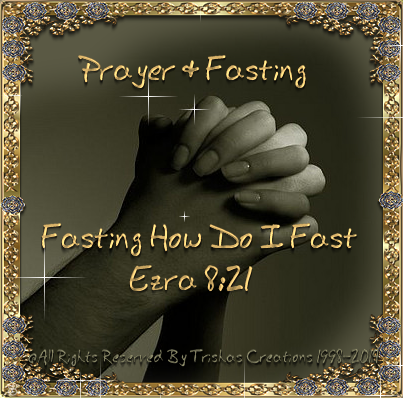Fasting How Do I Fast
 Fasting How Do I Fast
Fasting How Do I Fast
2 Chronicles 20:3
Fasting means eating little or no food, either from necessity or by choice. In medicine, fasting means flushing unhealthy substances out of the body by restricting food.
I wish, I could get my husband to understand this, but he refuses to allow me to fast. He don’t want me doing without eating. I have tried to explain to him, what it is about but it’s a no go. So, please pray that he allows me to fast sometimes, and for the Lord to work in him.
Spiritual fasting, on the other hand, means more than just reducing the amount of food one eats. It also means cutting down on the activities one does and replacing these with prayer and meditation on spiritual concerns.
The New Testament word that is translated “fasting” literally means one who has not eaten, one who is empty.
Three types of fast are generally recognized:
1. Normal, in which there is no food for a period of time, though there may be liquids;
2. Partial, in which the diet is limited, though some food is allowed;
3. Absolute, in which no foods or liquids are taken into the body in any way.
In the Old Testament the fast was thought of as a way of renouncing oneself and as a way of reducing God’s anger, moving him to forgiveness.
In times of emergency, the people fasted to persuade God to spare them from calamity Judges 20:26; 1 Samuel 7:6; 1 Kings 21:9; 2 Chronicles 20:3; Jeremiah 36:6, 9.
Individual people fasted in the hope that God would save them from trouble 2 Samuel 12:16-20; 1 Kings 21:27; Psalms 35:13; 69:10.
Prayer was a part of fasting Ezra 8:21; Nehemiah 1:4; Jeremiah 14:12.
Regular fasts usually lasted one day, morning to evening, with food permitted at night Judges 20:26; 1 Samuel 14:24; 2 Samuel 1:12, although there are reports of longer fasts, such as Mordecai’s call for a three-day fast (night and day specified-Esther 4:16 and the seven-day fast at Saul’s death 1 Samuel 31:13; 2 Samuel 3:35.
Special fasts included Moses’ forty days on Mount Sinai Exodus 34:28 and Daniel’s three-week fast prior to receiving visions Daniel 9:3; 10:3, 12.
Fasting was often abused during Old Testament times. It was often done insincerely and as a way of showing off; rather than fasting for God, people fasted so that they would seem pious and spiritual. The prophets cry out against this kind of fasting, as in Jeremiah, in which the Lord says “Though they fast, I will not hear their cry” Jeremiah 14:12, RSV; see Isaiah 58:1-10.
During the time between the Old and New Testaments, a great tradition grew up around the practice of fasting. People confirmed vows by fasting; remorse and penitence were accompanied by fasting; and prayer was supported by fasting.
Special fast days were observed, some voluntarily imposed. In the opinion of many rabbis, fasting was the primary way to demonstrate one’s piety. Those who fasted often wore mournful expressions on their faces, and the mood of fasting was one of gloom.
Jesus thought of fasting differently. He fasted as part of his temptation in the wilderness Matthew 4:2; Luke 4:2, and taught about fasting in the Sermon on the Mount Matthew 6:16-18. These two scenes from the Gospels tell us about his mature attitude toward fasting.
Jesus’ temptation took place in the midst of a struggle. Immediately after his baptism, he was cast out into the wilderness by the Spirit to face the temptation of Satan. He fasted and prayed during this time because he was depending totally upon God.
Jesus’ words about fasting in the Sermon on the Mount illustrate a totally different approach to fasting than the one taken by many teachers who lived at the same time. Jesus condemns the type of fasting that seeks to impress people. He gives it a new meaning: Fasting is service to God. This new meaning is part of Jesus’ message of hope and salvation. The Bridegroom (Jesus) is here. It is a time of joy, not of sorrow.
The coming of the Messiah has broken the power of the evil age. This means that fasting is inconsistent with the joy and happiness of the new age that Christ has brought, but because the kingdom of God is not fully realized-has not completely arrived here on earth-there is still a place for a certain kind of fasting.
It should be a part of prayer, and we should fast in the same way that we pray: with quietness before God, not trying to show off, grateful and thankful, grounded in faith, hoping to grow spiritually.
![]()